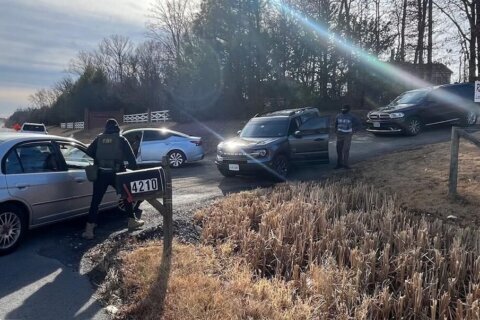In 2017, Prince William County, Virginia, resident Adelle Settle heard a radio story about a boy in New Mexico who had gone through his school’s lunch line.
When the boy approached the cashier, as Settle said the story went, the cashier told him there was no money in his account. So, the cashier took his lunch away and gave him a paper bag with a cold cheese sandwich instead.
The anecdote resonated with Settle, who didn’t have a school-aged child at the time, but was worried about what was happening to students with similar school meal debt in her neighborhood.
She learned kids being denied meals was a common occurrence.
“If their parents can’t afford to put money on that account, they’re going to get that alternative meal day after day after day,” Settle said. “It’s not going to be the balanced, healthy, nutritious meal that everybody else is getting. And it’s probably going to be hurting those kids in terms of their academic achievement and their behavior, and so many things that could be addressed very simply by just giving them a fair meal.”
So, Settle started raising money in 2017, initially collecting enough money to pay off lunch debt at three local elementary schools. Her nonprofit Settle the Debt has raised about $250,000 since 2017, including almost $65,000 this year that will be used to pay off meal debt in Prince William County Public Schools.
“I want kids to go to school and eat, and never worry about who’s paying for it or how it’s getting covered,” Settle said.
She fundraises mainly using Facebook, Twitter and Instagram posts, and said that several larger donors are Prince William County school graduates who have started successful businesses. She also gets donations from people all over the country who praise the concept.
Settle said she has a bookkeeper for the organization, which has to pay credit card fees. But beyond that, most of the donated money is shared with schools. At the end of the year, “we all but empty that account into the Prince William County Schools budget, so we write a check,” she said.
The school system had about $400,000 in meal debt this year, Settle said. Thirty county schools receive Community Eligibility Provision funding, which is federal money for schools with a demonstrated need. But the others have debt accumulating.
The 2022-23 school year was also the first that students and families have had to pay for meals since before the pandemic. For two years, the government covered school meals for every public school throughout the country, she said.
“This is the first year that families are having to readjust their budgets to absorb that cost again,” Settle said. “A lot of families got used to not having to pay for school meals, and with inflation and with lost jobs during the pandemic, and just general recovery from a very stressful time for many families, I think it’s become a little more of a struggle to pay for school meals.”
Some students qualify for free school meals, but those that don’t could go into debt if they buy a lunch when there’s no money in their account.
Alternative meals like the one the boy in the radio story received aren’t legal in Virginia, so if a student enters the lunch line, they can’t be denied a meal, even if it means accumulating more meal debt, Settle said.
Settle said she doesn’t talk to the kids she’s helping to support, but she does tell families “if you have to go into meal debt, you have to go into meal debt. It’s OK. I will do my very best to take care of it through Settle the Debt.”








